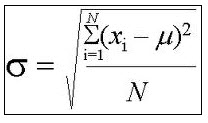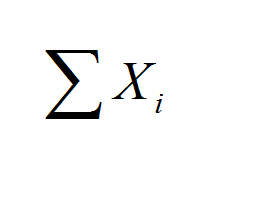Summation Calculator
Instructions: Use this Summation Calculator to get the sum of all the values from a sample provided in the form below. The sample needs to be comma or space separated:
Summation Calculator
This calculator allows you to find the sum of the values provided. For example, if you provide the values 2, 10, 3, 3, 4, 5, 5, 6, 7, 7, 7, 8, the calculator will compute its summation as follow:
\[S = 2 + 10 + 3 + 3 + 4 + 5 + 5 + 6 + 7 + 7 + 7 + 8 = 67\]Being able to compute the sum of the values of a sample is important, because that is the foundation required to compute the sample mean. Indeed, the sample mean of a sample is obtained simply by getting the total sum of the values in the sample, and dividing by the sample size.
Sigma - Summation Notation
Mathematically, there is on very compact and useful notation to denote summations. Assume we have a sample \(X_1, X_2, ...., X_n\). The long way of representing the sum is
\[ X_1 + X_2 + ....+ X_n\]Using the sigma-notation, a summation of the sample \(X_1, X_2, ...., X_n\) can be written as follows:
\[ X_1 + X_2 + ....+ X_n = \sum_{i=1}^n X_i\]Having such a clear and compact notation makes the algebraic work of summation much easier, at least in what is respected with expanding or simplifying its terms, which is frequently required in Statistics.
For a more complete set of statistics, please check our step-by-step descriptive statistics calculator , which will provide you with a complete set of statistics.





